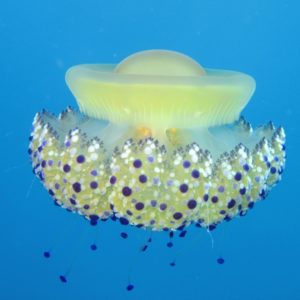 Scientists at Caltech have found that at least one genus of jellyfish sleeps. A primitive jellyfish called Cassiopea has been observed to sleep. This news indicates that sleep developed very early within animals. It also begs the question as to what causes an animal to go to sleep. Is it caused by neurons? Do non-animals like plants sleep in some fashion?
Scientists at Caltech have found that at least one genus of jellyfish sleeps. A primitive jellyfish called Cassiopea has been observed to sleep. This news indicates that sleep developed very early within animals. It also begs the question as to what causes an animal to go to sleep. Is it caused by neurons? Do non-animals like plants sleep in some fashion?
Sleep has been observed in other invertebrates like worms and fruit flies – but those creatures at least have brains, while jellyfish do not. Instead, they have a network of nerves called a “nerve net” throughout their epidermis. Jellyfish are also the oldest multi-organ animal that still exists; they are believed to have developed as long ago as 500 to 700 million years.
The scientists agreed that an organism must meet three criteria to be considered asleep: 1) It had to demonstrate quiescence or reduced activity; 2) it had to show a reduced response to stimuli and; 3) a sleep-deprived individual had to show an increased sleep deprive. Humans, for example, fit all three criteria. A sleeping human doesn’t move much and can sleep through noises and other stimuli that would prompt a response if they were awake. A person who has not gotten enough sleep will either fall asleep during the day or take a nap.
The researchers set up cameras around the jellyfish tank to observe its sleep patterns. When Cassiopea is awake, its body pulsates about 58 times per minute. When it’s sleeping, its body pulsates only 39 times per minute, thus meeting the first criterion. The researchers also found that Cassiopea sleeps during the night like most humans do.
Cassiopea is a bottom-dweller that rests on the sea floor. To test for a decreased response to stimuli, the researchers would therefore place the jellyfish on a platform and give it a chance to settle. They would then pull the platform out from under the animal. A jellyfish that was awake would immediately swim to the bottom of the tank, while one that had been sleeping would float for about five seconds before waking up, righting itself and then swimming to the bottom of the tank.
Testing for the third criterion required the scientists to keep the jellyfish awake past their bed time. They did so by “poking” them every ten seconds with pulses of water. The jellyfish were more likely to become quiescent or fall asleep during the day when they were normally active.
The researchers also studied the effects of melatonin and other compounds that promote sleep and found that the jellyfish responded to such compounds by falling asleep. That suggests the same mechanisms that govern sleep in other animals also regulates it in jellyfish. The results of the study have been published by the journal “Current Biology” and can be read online.
https://en.wikipedia.org/wiki/Jellyfish
http://www.sciencemag.org/news/2017/09/you-don-t-need-brain-sleep-just-ask-jellyfish





